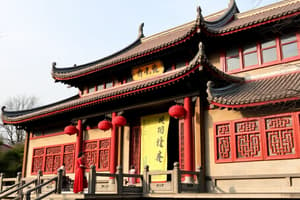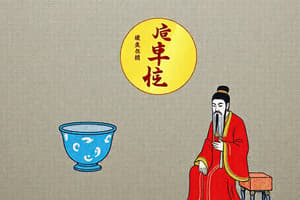Podcast
Questions and Answers
先秦哲學的興起背景是什麼?
先秦哲學的興起背景是什麼?
- 周王的改革
- 周文的繁榮
- 周文的疲弊 (correct)
- 周文的重建
孔子所提倡的理想社會秩序是基於什麼理念?
孔子所提倡的理想社會秩序是基於什麼理念?
- 德治 (correct)
- 志治
- 法治
- 自然法則
儒家對於人倫觀的理解有哪些基本關係?
儒家對於人倫觀的理解有哪些基本關係?
- 父母、子女、婚姻、友誼
- 君主、士大夫、平民、朋友
- 父子、兄弟、朋友、君臣
- 父子、君臣、夫婦、兄弟、朋友 (correct)
孔子所說的'仁'和'禮'有何區別?
孔子所說的'仁'和'禮'有何區別?
在儒家的教育理念中,'禮教'的主要目的為何?
在儒家的教育理念中,'禮教'的主要目的為何?
儒家的人倫關係中,'父子有親'主要強調什麼?
儒家的人倫關係中,'父子有親'主要強調什麼?
在儒家理論中,君臣之間的理想關係是什麼?
在儒家理論中,君臣之間的理想關係是什麼?
儒家認為'五倫'的基本結構能夠促進什麼?
儒家認為'五倫'的基本結構能夠促進什麼?
在儒家理論中,'兄弟有序'意指什麼?
在儒家理論中,'兄弟有序'意指什麼?
儒家的社會秩序理想是基於哪種元素?
儒家的社會秩序理想是基於哪種元素?
儒家人倫觀強調的是什麼?
儒家人倫觀強調的是什麼?
在儒家思想中,什麼是君子的本質規定?
在儒家思想中,什麼是君子的本質規定?
孟子的性善論中,人性本善的原因是什麼?
孟子的性善論中,人性本善的原因是什麼?
孔子認為人性中善與惡的關係是什麼?
孔子認為人性中善與惡的關係是什麼?
根據儒家思想,君子在面對天下事務時應如何行事?
根據儒家思想,君子在面對天下事務時應如何行事?
儒家信仰中,如何看待人性的根本特徵?
儒家信仰中,如何看待人性的根本特徵?
在何種情況下,孔子認為仁德能夠達到?
在何種情況下,孔子認為仁德能夠達到?
根據孟子的學說,欠缺羞恥心的人會被認為怎樣?
根據孟子的學說,欠缺羞恥心的人會被認為怎樣?
儒家人性論的核心在於什麼?
儒家人性論的核心在於什麼?
在儒家中,道德活動是如何理解的?
在儒家中,道德活動是如何理解的?
孟子認為仁政能夠實現的關鍵是什麼?
孟子認為仁政能夠實現的關鍵是什麼?
儒家中「仁」的特性不包括哪一項?
儒家中「仁」的特性不包括哪一項?
孔子認為的“中庸之德”主要強調的是什麼?
孔子認為的“中庸之德”主要強調的是什麼?
Flashcards
儒家的人倫觀
儒家的人倫觀
儒家認為,建立社會秩序的關鍵是禮,禮包含禮節、禮儀和禮制等,以及以教育手段將人倫關係的規範內化。
禮的兩重意義
禮的兩重意義
禮有外在的規範(禮節、禮儀、禮制)和內在的教化(禮教)兩種意義。
五倫
五倫
儒家認為最基本的人倫關係,包括父子、君臣、夫婦、兄弟、朋友。
禮的例子:五倫
禮的例子:五倫
Signup and view all the flashcards
孔子:由禮到仁
孔子:由禮到仁
Signup and view all the flashcards
仁
仁
Signup and view all the flashcards
禮為用
禮為用
Signup and view all the flashcards
仁為體
仁為體
Signup and view all the flashcards
周文疲弊
周文疲弊
Signup and view all the flashcards
五倫之理想關係
五倫之理想關係
Signup and view all the flashcards
儒家倫理重視什麼?
儒家倫理重視什麼?
Signup and view all the flashcards
儒家倫理的出發點是什麼?
儒家倫理的出發點是什麼?
Signup and view all the flashcards
儒家倫理中『義』的意義?
儒家倫理中『義』的意義?
Signup and view all the flashcards
君子喻於義是什麼意思?
君子喻於義是什麼意思?
Signup and view all the flashcards
儒家倫理的實踐智慧是什麼?
儒家倫理的實踐智慧是什麼?
Signup and view all the flashcards
由禮到仁是什麼意思?
由禮到仁是什麼意思?
Signup and view all the flashcards
儒家人性論的核心?
儒家人性論的核心?
Signup and view all the flashcards
孔子對人性的看法?
孔子對人性的看法?
Signup and view all the flashcards
孟子的人性論?
孟子的人性論?
Signup and view all the flashcards
孟子的人禽之辨?
孟子的人禽之辨?
Signup and view all the flashcards
孟子性善論的證據?
孟子性善論的證據?
Signup and view all the flashcards
儒家認為『仁』是什麼?
儒家認為『仁』是什麼?
Signup and view all the flashcards
儒家的人性論對人有什麼影響?
儒家的人性論對人有什麼影響?
Signup and view all the flashcards
Study Notes
Individual Assignment (1)
- Submission Deadline: October 11, 2024 (Friday, week 6) 5:00 PM
- Submit through Turnitin
- Submit as a PDF file
Lecture Three: Exploring Life, Death, and Human Relations in Traditional Chinese Thought
- This lecture examines the Confucian perspective on life, death, and human relationships.
- It delves into Confucian views on human relationships and ethics.
How to Approach Complex Philosophical Theories?
- Identify problems within the social or political context that the thinker addresses.
- Analyze how the philosopher viewed and defined the issue.
- Examine the causes of the problem according to the thinker.
- Explore the proposed solutions.
- Acknowledge how contemporaries viewed the thinker's perspective and potential solutions.
- Evaluate the proposed solutions in a modern context.
Rise of Pre-Qin Philosophy: Zhou Dynasty Decline
- According to Mou Zongsan, the decline of the Zhou dynasty prompted various schools of thought to propose solutions.
- Philosophers from various schools address problems stemming from societal ills of the decline of the Zhou Dynasty
Confucius: From Ritual to Benevolence
- The Spring and Autumn Period was a time of social upheaval and political instability.
- Confucius aimed to establish social harmony through ethical principles, particularly ritual and benevolence.
- The basis of Confucian philosophies are to establish social and political order through the cultivation of personal morality, emphasizing ritual propriety and benevolence as foundational elements.
Confucianism: Principles of Ritual and Benevolence
- The primary goal of Confucianism is to restore social order and harmony.
- This philosophical system emphasizes the importance of ritual and benevolence as means to achieve this goal.
Confucius: From Ritual to Benevolence (Detailed)
- Ritual (li): External practices and norms that govern social interactions and relationships (e.g.etiquette)
- Benevolence (ren): Internal disposition of compassion, empathy, humaneness (e.g. inner goodness)
- Confucianists believe that adherence to established rituals will cultivate a predisposition toward benevolence in everyday behavior.
Confucius: Beginning with Ritual
- Starting with ritual propriety is one of the key themes of Confucian thought.
Confucianism: Structure and Meaning of Ritual
- Ritual, or li, was the external aspect of achieving societal harmony and benevolence.
- It establishes proper social order and proper conduct.
Confucian View on Human Relations: Establishing Human Relationships
- Confucianism outlines principles for various interpersonal relationships, including those between father and son, ruler and subject, husband and wife, elder and younger sibling, and friend and friend—forming a system of hierarchical relationships.
Confucianism: Five Key Relationships
- The five key relationships (five cardinal relationships) are: father and son, ruler and subject, husband and wife, elder and younger sibling, and friend and friend—this framework emphasizes hierarchical relationships.
Confucianism: Structure and Meaning of Ritual (Explanation)
- Confucius emphasized the importance of fulfilling roles and responsibilities within these relationships, believing this observance would foster benevolence and a harmonious society.
Confucian Theory of Human Relationships (Detailed)
- The philosopher’s view is that harmonious societal relations begin with proper conduct in fundamental relationships.
Confucianism: Emphasizing Human Relationships
- Confucianism views interpersonal relationships as the foundation of a harmonious society.
Confucianism: Human Relationships through Ritual
- The core belief in Confucianism is that through observation and adherence to rituals and roles, one will eventually cultivate a benevolent disposition, leading to a harmonious societal organization.
Confucianism: Defining the Concept of Ritual
- Examining ritual is a way of understanding human conduct, relations, and societal harmony based on observing Confucius’s philosophy.
Core Meaning of Confucian Ritual
- Ritual is a significant concept in Confucianism, focusing on the proper conduct and observance of established norms in social life for societal harmony.
Nature of Ritual in Confucianism
- Ritual in Confucianism fosters a harmonious society by guiding individuals in proper actions within social and political structures.
Confucianism: Practical Application of Ritual
- To analyze the practicality of Confucianism regarding ritual, examining how it guides individuals' actions in practical social contexts is necessary.
Confucian Theory of Ethics: The Principles of Ritual and Benevolence
- To understand Confucian ethics, especially ritual and benevolence principles, delve into how they offer concrete guidelines for morally appropriate practices within interpersonal interactions.
Learning about Confucianism and Ritual
- To grasp Confucianism, the importance of studying ritual propriety, its role in fostering ethical behavior, and harmonious relationships within society is evident.
Ethics within Human Relationships
- Through studying Confucian philosophy, one can gain a deeper understanding of how ethical principles guide and inform interpersonal relationships to cultivate societal harmony.
Confucius: Theory of Human Nature
- Confucius's view on human nature is nuanced and multifaceted.
- His teaching emphasized a balance between human nature and the moral cultivation inherent in rituals to achieve societal harmony.
Confucianism: Human Nature and Ritual
- The Confucian philosophy highlights the interconnectedness between the adherence to ritual and the cultivation of ethical principles. This approach to society emphasizes both internal disposition (benevolence) and external conduct regulated by ritual.
Mending Society from Instability
- When a society displays signs of instability, the role of Confucianism, particularly its emphasis on ritual, becomes crucial in restoring harmony.
Confucian View on Human Nature
- Confucius believed that human nature is inherently good, but it needs the cultivation of rituals and ethical practices to reach its full potential.
Confucius, Human Nature, and Society
- Understanding Confucius's theory of human nature is vital for appreciating his philosophy's impact on individual self-cultivation and societal harmony.
Why Study Confucianism?
- Analyzing Confucian philosophies, particularly its views on human nature and ritual, is vital for comprehending the formation of Chinese society.
Analysis of Confucian Thought on Human Nature
- Confucian teachings on human nature, especially when examining concepts such as ritual practice and human relationships, contribute to understanding Confucian values
Mencius Theory of Human Nature/Benevolence
- Mencius viewed human nature as inherently good.
- His central concept is inherent goodness and the cultivation of benevolent tendencies.
Mencius: Theory of Human Nature
- Mencius argued that human nature is inherently good, and people are capable of great kindness and compassion.
Mencius and Human Nature
- Mencius emphasized that human nature is inherently good, needing nurturing rather than repression.
Mencius: Argument for Inherent Goodness
- Mencius posited the innate goodness of human nature, arguing that a conscious effort toward cultivating inherent benevolence was pivotal.
Mencius: Nature of Innate Goodness
- Mencius emphasized the inherent goodness of nature.
Mencius: Innate Goodness and Potential
- Mencius's concept of innate goodness suggested that humans are born with the capacity for good and can reach their moral potential with proper guidance and nurture.
Mencius and Ethics
- Mencius established a concept of innate morality, outlining how innate goodness and proper guidance can lead to ethical behavior.
Mencius: Innate Goodness and Social Harmony
- Mencius’ ethical theory hinges on the principle that human nature is inherently good, and that fostering social harmony rests on nurturing this natural goodness.
Mencius: Goodness, Nurturing, and Harmony
- Mencius’ theory connected innate goodness in people with the concept of societal harmony.
Mencius: Arguments for Ethical Direction
- To analyze Mencius's ethics, focus on the role of education, moral cultivation, and government in fostering benevolent behavior.
Mencius: Ethical Implications
- Mencius's insights on human nature and their ethical implications in society offer valuable insights.
Mencius: Evaluating Ethical Arguments
- Evaluating Mencius's ethical theories requires examining their theoretical basis and practical application in ancient China.
Xunzi: Human Nature as Evil
- Xunzi presented a contrasting view on human nature, arguing that it is inherently selfish and requires rigorous restraint to be good.
Xunzi: Theory of Human Nature
- Xunzi held a very different perspective on human nature compared to Mencius, arguing that humans are born selfish and require structure to become good.
Xunzi: Human Nature and Moral Cultivation
- Xunzi viewed human nature as inherently evil, requiring strict social and moral training for individuals to attain goodness.
Xunzi: Evil Nature, Social Structures, and Morality
- To understand Xunzi's perspective on human nature and morality, explore his ideas on how social structures and rigorous education shape behavior to counteract inherent human flaws.
Xunzi: The Role of Learning in Morality
- To comprehend Xunzi's moral philosophy, concentrate on the importance of learning and social norms in shaping individuals toward morality and counteracting their perceived natural inclination towards evil.
Xunzi: Moral Development
- Xunzi's concept of human nature emphasized the importance of rigorous moral education in developing virtuous conduct.
Xunzi's Concept of Moral Development
- Xunzi's moral philosophy provides a framework for understanding moral evolution in individuals.
Xunzi's Theory of Ethical Application
- Xunzi viewed human nature as inherently flawed, requiring rigid social and moral structure to develop goodness.
Summary of Xunzi's Teachings
- Xunzi's theories on human nature and necessary social structures for upholding morality provide a sharp contrast to Mencius’ views.
Questions to Guide Further Study
- How do Confucian, Mencian, and Xunzi philosophies interpret human nature in relation to contemporary social issues?
Studying That Suits You
Use AI to generate personalized quizzes and flashcards to suit your learning preferences.




